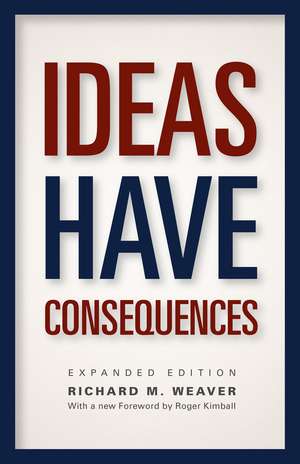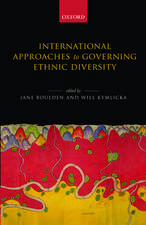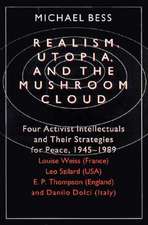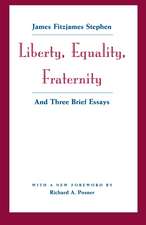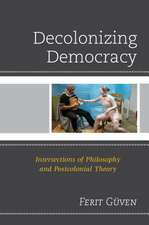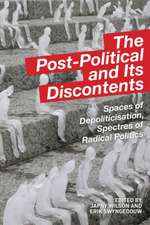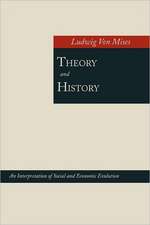Ideas Have Consequences: Expanded Edition: Emersion: Emergent Village resources for communities of faith
Autor Richard M. Weaver Cuvânt înainte de Roger Kimball Cuvânt după de Ted J. Smith, IIIen Limba Engleză Paperback – 4 noi 2013
Originally published in 1948, at the height of post–World War II optimism and confidence in collective security, Ideas Have Consequences uses “words hard as cannonballs” to present an unsparing diagnosis of the ills of the modern age. Widely read and debated at the time of its first publication,the book is now seen asone of the foundational texts of the modern conservative movement.
In its pages, Richard M. Weaver argues that the decline of Western civilization resulted from the rising acceptance of relativism over absolute reality. In spite of increased knowledge, this retreat from the realist intellectual tradition has weakened the Western capacity to reason, with catastrophic consequences for social order and individual rights. But Weaver also offers a realistic remedy. These difficulties are the product not of necessity, but of intelligent choice. And, today, as decades ago, the remedy lies in the renewed acceptance of absolute reality and the recognition that ideas—like actions—have consequences.
This expanded edition of the classic work contains a foreword by New Criterion editor Roger Kimball that offers insight into the rich intellectual and historical contexts of Weaver and his work and an afterword by Ted J. Smith III that relates the remarkable story of the book’s writing and publication.
In its pages, Richard M. Weaver argues that the decline of Western civilization resulted from the rising acceptance of relativism over absolute reality. In spite of increased knowledge, this retreat from the realist intellectual tradition has weakened the Western capacity to reason, with catastrophic consequences for social order and individual rights. But Weaver also offers a realistic remedy. These difficulties are the product not of necessity, but of intelligent choice. And, today, as decades ago, the remedy lies in the renewed acceptance of absolute reality and the recognition that ideas—like actions—have consequences.
This expanded edition of the classic work contains a foreword by New Criterion editor Roger Kimball that offers insight into the rich intellectual and historical contexts of Weaver and his work and an afterword by Ted J. Smith III that relates the remarkable story of the book’s writing and publication.
Din seria Emersion: Emergent Village resources for communities of faith
-
 Preț: 144.99 lei
Preț: 144.99 lei -
 Preț: 133.99 lei
Preț: 133.99 lei - 9%
 Preț: 352.50 lei
Preț: 352.50 lei -
 Preț: 146.50 lei
Preț: 146.50 lei -
 Preț: 208.32 lei
Preț: 208.32 lei -
 Preț: 156.84 lei
Preț: 156.84 lei -
 Preț: 115.53 lei
Preț: 115.53 lei -
 Preț: 548.71 lei
Preț: 548.71 lei - 8%
 Preț: 346.31 lei
Preț: 346.31 lei - 8%
 Preț: 360.28 lei
Preț: 360.28 lei -
 Preț: 216.90 lei
Preț: 216.90 lei -
 Preț: 101.43 lei
Preț: 101.43 lei -
 Preț: 215.52 lei
Preț: 215.52 lei -
 Preț: 185.37 lei
Preț: 185.37 lei - 8%
 Preț: 563.24 lei
Preț: 563.24 lei -
 Preț: 179.04 lei
Preț: 179.04 lei -
 Preț: 106.35 lei
Preț: 106.35 lei -
 Preț: 273.93 lei
Preț: 273.93 lei -
 Preț: 127.89 lei
Preț: 127.89 lei - 9%
 Preț: 353.24 lei
Preț: 353.24 lei -
 Preț: 176.49 lei
Preț: 176.49 lei -
 Preț: 94.22 lei
Preț: 94.22 lei -
 Preț: 144.80 lei
Preț: 144.80 lei -
 Preț: 126.25 lei
Preț: 126.25 lei -
 Preț: 67.35 lei
Preț: 67.35 lei -
 Preț: 163.52 lei
Preț: 163.52 lei -
 Preț: 138.26 lei
Preț: 138.26 lei -
 Preț: 182.98 lei
Preț: 182.98 lei - 18%
 Preț: 502.35 lei
Preț: 502.35 lei - 18%
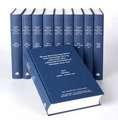 Preț: 2261.34 lei
Preț: 2261.34 lei -
 Preț: 279.55 lei
Preț: 279.55 lei -
 Preț: 116.07 lei
Preț: 116.07 lei -
 Preț: 208.55 lei
Preț: 208.55 lei -
 Preț: 167.85 lei
Preț: 167.85 lei -
 Preț: 160.63 lei
Preț: 160.63 lei -
 Preț: 183.89 lei
Preț: 183.89 lei - 9%
 Preț: 352.77 lei
Preț: 352.77 lei -
 Preț: 307.55 lei
Preț: 307.55 lei - 12%
 Preț: 290.56 lei
Preț: 290.56 lei - 8%
 Preț: 311.68 lei
Preț: 311.68 lei -
 Preț: 120.81 lei
Preț: 120.81 lei -
 Preț: 229.92 lei
Preț: 229.92 lei - 6%
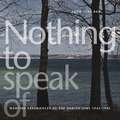 Preț: 324.95 lei
Preț: 324.95 lei -
 Preț: 145.41 lei
Preț: 145.41 lei -
 Preț: 152.07 lei
Preț: 152.07 lei -
 Preț: 186.09 lei
Preț: 186.09 lei - 18%
 Preț: 348.59 lei
Preț: 348.59 lei -
 Preț: 302.76 lei
Preț: 302.76 lei - 8%
 Preț: 565.01 lei
Preț: 565.01 lei
Preț: 138.81 lei
Nou
Puncte Express: 208
Preț estimativ în valută:
26.56€ • 27.93$ • 21.95£
26.56€ • 27.93$ • 21.95£
Carte disponibilă
Livrare economică 27 martie-10 aprilie
Livrare express 12-18 martie pentru 21.48 lei
Preluare comenzi: 021 569.72.76
Specificații
ISBN-13: 9780226090061
ISBN-10: 022609006X
Pagini: 224
Dimensiuni: 140 x 216 x 18 mm
Greutate: 0.3 kg
Ediția:Mărită
Editura: University of Chicago Press
Colecția University of Chicago Press
Seria Emersion: Emergent Village resources for communities of faith
ISBN-10: 022609006X
Pagini: 224
Dimensiuni: 140 x 216 x 18 mm
Greutate: 0.3 kg
Ediția:Mărită
Editura: University of Chicago Press
Colecția University of Chicago Press
Seria Emersion: Emergent Village resources for communities of faith
Notă biografică
Richard M. Weaver (1910–63) was an American scholar, revered twentieth-century conservative, and professor of English and rhetoric at the University of Chicago. He is the author of several books, including The Ethics of Rhetoric and Visions of Order: The Cultural Crisis of Our Time.
Cuprins
Foreword to the Expanded Edition
The Consequences of Richard Weaver / By Roger Kimball
Foreword / By Richard M. Weaver
Introduction
1 The Unsentimental Sentiment
2 Distinction and Hierarchy
3 Fragmentation and Obsession
4 Egotism in Work and Art
5 The Great Stereopticon
6 The Spoiled-Child Psychology
7 The Last Metaphysical Right
8 The Power of the Word
9 Piety and Justice
Afterword
How Ideas Have Consequences Came to Be Written / By Ted J. Smith III
Acknowledgments
Notes
The Consequences of Richard Weaver / By Roger Kimball
Foreword / By Richard M. Weaver
Introduction
1 The Unsentimental Sentiment
2 Distinction and Hierarchy
3 Fragmentation and Obsession
4 Egotism in Work and Art
5 The Great Stereopticon
6 The Spoiled-Child Psychology
7 The Last Metaphysical Right
8 The Power of the Word
9 Piety and Justice
Afterword
How Ideas Have Consequences Came to Be Written / By Ted J. Smith III
Acknowledgments
Notes
Recenzii
“A profound diagnosis of the sickness of our culture.”
“Brilliantly written, daring, and radical. . . . it will shock, and philosophical shock is the beginning of wisdom.”
“Richard M. Weaver’s book is important; his explanation of the breakdown of modern man is the best in years.”
“This deeply prophetic book not only launched the renaissance of philosophical conservatism in this country, but in the process gave us an armory of insights into the diseases besetting the national community that is as timely today as when it first appeared. Ideas Have Consequences is one of the few authentic classics in the American political tradition.”
